This
page only contains excerpts from interviews Ray Carney has given.
In the two interviews excerpted below, Ray Carney discusses his
background and academic training. For more information about his
writing on independent film, including a new collection of interviews
with him in which he gives his views on criticism, film, and the
life of a writer, click
here.
Click
here for best printing of text
|
An
Interview with Ray Carney
by Cynthia Rockwell
for NewEnglandFilm.com
RAY CARNEY is well
known for his attacks on the Hollywood filmmaking establishment,
and the journalists,
critics, and film professors who,
in his view, support it—as he put it to me: “by conducting
sycophantic interviews with airhead movie stars, inviting celebrity directors
into the classroom, and generally functioning as unpaid publicists for
every studio blockbuster that comes along.” He is generally recognized
to be the world's expert on the life and work of the 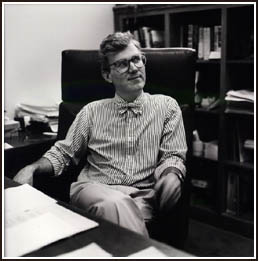 “father of
the American independent movement,” actor-writer-director John
Cassavetes. He has just published three new books about the filmmaker:
Cassavetes on Cassavetes,
described as “Cassavetes’ spiritual
autobiography;” the British Film Institute Film Classics volume
on Cassavetes’ first film, Shadows, which reveals new
facts about the making of the movie; and a viewer’s guide to
the films titled John Cassavetes: The Adventure of Insecurity.
He is a Professor of Film and American Studies at Boston University,
Director of the Film Studies
program, and chair of graduate admissions. As a former student of his,
I wanted to begin our conversation with an exploration of his background
and training, and a few questions about how he got
into film and got interested in Cassavetes in particular. “father of
the American independent movement,” actor-writer-director John
Cassavetes. He has just published three new books about the filmmaker:
Cassavetes on Cassavetes,
described as “Cassavetes’ spiritual
autobiography;” the British Film Institute Film Classics volume
on Cassavetes’ first film, Shadows, which reveals new
facts about the making of the movie; and a viewer’s guide to
the films titled John Cassavetes: The Adventure of Insecurity.
He is a Professor of Film and American Studies at Boston University,
Director of the Film Studies
program, and chair of graduate admissions. As a former student of his,
I wanted to begin our conversation with an exploration of his background
and training, and a few questions about how he got
into film and got interested in Cassavetes in particular.
Cynthia Rockwell:
You've written several definitive books on John Cassavetes and his
work—can
you describe what it was that originally attracted you to his work?
Ray Carney: My taste in movies has always been a little weird. Probably
as a result of coming to them pretty late. As a kid and a teenager, I
lived far out in the country, and saw almost nothing. I went to a few
movies in college [at Harvard], but really only began to get interested
in film in my twenties, during my grad school years [at Rutgers]. But
not Hollywood movies! You need to know some background to understand
this. So bear with me, OK?.
Near the end of my college
years, I had this epiphany about art as the ultimate form of human
expression. All the time I was growing up, my
family had had no interest in art at all. None. My father was a businessman;
there was not one really good book or record in my house; and no awareness
that arts like ballet or opera even existed. I began college as a math
and physics major. I was a real science buff—pretty good at it
too. Had won prizes and awards and scholarships. A fellowship from the
National Science Foundation while I was in high school. The whole nine
yards. I knew what I wanted to do with my life. It was all mapped out
for me. But then magic happened. Due to an “artistic” Radcliffe
girlfriend who threw my life into intellectual and emotional turmoil,
I discovered painting, literature, drama, and the other arts. Meeting
her and suddenly having this world opened to me was like being hit by
a falling piano. I was mystified, bewildered, destroyed. It was a life-changing
experience. And that’s an understatement!
End of Mr. Math Whiz. I went
to grad school to take a Ph.D. in English literature, and by this point
was completely flipped out, totally obsessed
with art. Crazy. Uncontrollable. There’s no proselytizer like a
convert. I would invite friends to my house on Saturday nights and force
them to sight-read Shakespeare. I read the complete Faerie Queene out
loud to another girlfriend. It’s the longest poem in English—hundreds
of pages of tiny type and it took months. (She must have had the patience
of a saint to have put up with it.) I set myself these heroic goals.
I 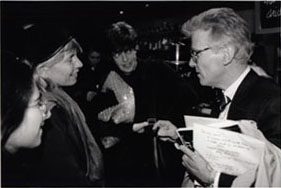 attempted to read the complete works of all the biggies. Totally nuts!
I worked my way through Beethoven, Armstrong, Parker, Basie, Ellington,
and Goodman. I hacked a path through deepest, darkest, late Henry James.
I went to used record stores and got every LP Lenny Bruce had ever recorded.
I didn’t have much money, but even on a graduate student’s
budget, I managed to scrape together enough to go to the ballet every
week (sitting up in the fourth ring nosebleed seats at Lincoln Center
where the old ladies from the tour bus talk throughout the performance).
For a few years, I saw every Pinter or Chekhov play that came through
New York. Getting to a dance piece by Paul Taylor or George Balanchine
was more important than eating or paying the rent. attempted to read the complete works of all the biggies. Totally nuts!
I worked my way through Beethoven, Armstrong, Parker, Basie, Ellington,
and Goodman. I hacked a path through deepest, darkest, late Henry James.
I went to used record stores and got every LP Lenny Bruce had ever recorded.
I didn’t have much money, but even on a graduate student’s
budget, I managed to scrape together enough to go to the ballet every
week (sitting up in the fourth ring nosebleed seats at Lincoln Center
where the old ladies from the tour bus talk throughout the performance).
For a few years, I saw every Pinter or Chekhov play that came through
New York. Getting to a dance piece by Paul Taylor or George Balanchine
was more important than eating or paying the rent.
Am I making it clear that
this was some kind of insanity? I’ve
always been obsessive about anything I am interested in. I realized years
ago that if I weren’t interested in art, I’d probably be
into drugs or some other compulsive behavior big time. Too bad it’s
not making money or cleaning my house—I could use a little of that
kind of obsessiveness! Even now, I will fly into a city and see five
or six dance performances in a row or spend three consecutive days in
a big museum—all day, from opening to closing! I always warn anyone
who is foolish enough to come with me what they are in for. I will wear
anyone out standing in front of paintings! My friends are so patient
with me they should be canonized. Some people’s idea of fun is
to get a four-day pass to Disneyworld, mine is to spend four days in
a row in the Met or the National Gallery. I ran into Paul Taylor at an
intermission in City Center a few weeks ago, and told him how I impulse
binge on his works for three or four days at a time, matinees and evenings,
back to back. It was a comical conversation. Here I was talking to one
of my all-time heroes, and he smiled at me, I think he was laughing at
me, and said: “How can you stand it?” Of course, I told him
I couldn’t stand life otherwise. These sorts of experiences are
the only things that get me through most of the rest of life.
But I got off track. Back
to my salad days. Because of my art obsession, when I finally began
going to a few movies in my graduate school years,
I wasn’t looking for stupid sentimental story-telling and movie-star
glamour—but for the same kinds of experiences the literary and
musical works I loved gave me—turbulence, confusion, wildness,
challenge, mystery, shock, magic.
Maybe it comes down to the
fact that I got into film in a different way from most of the people
I know. Almost without exception, all of
the reviewers and directors I now know became interested in film because
at some point or other in their teens or twenties they felt this powerful
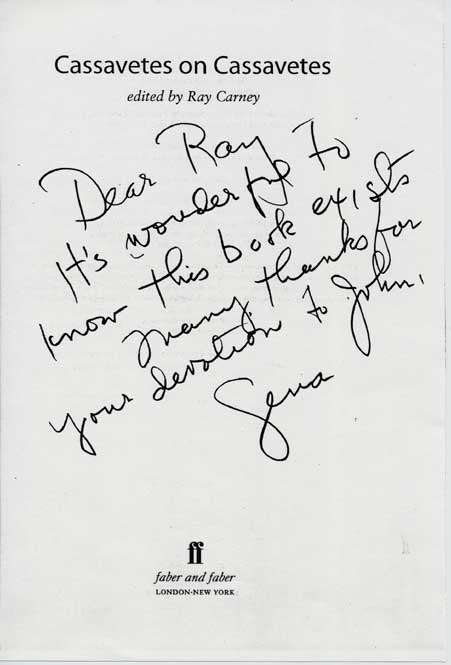 identification with some character or movie – or maybe with several
characters or movies. They saw Citizen Kane and identified with the loneliness
of the title character. They saw The Graduate and identified with the
powerlessness of the Dustin Hoffman character. They saw Star Wars and
felt like they were Luke Skywalker or Han Solo battling the Evil Empire.
They saw Edward Scissorhands and felt the Johnny Depp character was them.
They saw The Matrix or Titanic and felt in some deep part of their soul
that they were living Neo’s or Kate Winslett’s life. They
saw Thelma and Louise or Erin Brockovich and imagined that they were
just like them. They could outsmart the stupid plodding men in the world.
You get the idea. That wasn’t the way I became interested in movies.
I’ve never approached a movie that way, and don’t now. identification with some character or movie – or maybe with several
characters or movies. They saw Citizen Kane and identified with the loneliness
of the title character. They saw The Graduate and identified with the
powerlessness of the Dustin Hoffman character. They saw Star Wars and
felt like they were Luke Skywalker or Han Solo battling the Evil Empire.
They saw Edward Scissorhands and felt the Johnny Depp character was them.
They saw The Matrix or Titanic and felt in some deep part of their soul
that they were living Neo’s or Kate Winslett’s life. They
saw Thelma and Louise or Erin Brockovich and imagined that they were
just like them. They could outsmart the stupid plodding men in the world.
You get the idea. That wasn’t the way I became interested in movies.
I’ve never approached a movie that way, and don’t now.
Cynthia Rockwell:
What’s
wrong with identifying with a character?
Ray Carney: It’s a child’s way of thinking. It’s playing
with action figures, Halloween dress-up, a dolly tea-party,
not what appreciating art is about.
Cynthia Rockwell: What do you mean?
Ray Carney: You know, you
dress up your Barbie and “become her.” You
hold a tea party with your little friends and play mommy and auntie.
You take out your toy soldiers or your Hulk Hogan figure and slay the
world. That’s not what experiencing art is about. We know this
about other arts, but film appreciation is so infantilized that we forget
it. You don’t experience Paul Taylor’s Esplanade or
Picasso’s
Night Fishing at Antibes or Bach’s Goldberg Variations to
plug yourself into them that way, to feel better about yourself, to fantasize
that you are strong and mature and powerful. Those works make demands
on you. They test your powers of awareness. They expand your consciousness
in unexpected directions. They are not Rorschach blotches that you project
your fantasies of powerlessness into and get power by expanding within.
They are not about flattering you by allowing you to feel sorry for yourself
or to pretend you are more important than you really are. Art is not
about that. It’s not about cheering yourself up with flattering,
self-aggrandizing fantasies. That’s for kids. That’s
dressing up and playing pretend. That’s playing with action figures.
That’s reading a children’s story when you're eight or nine.
That’s the Halloween parade at school. That’s wearing your
Superman underoos. That’s pop culture. That’s Hollywood.
Cynthia Rockwell:
If you weren’t
interested in those things, why were you drawn to the movies at all?
Ray Carney: I was attracted
to complex, demanding, subtle emotional experiences that moved me into
new ways of feeling and thinking. I didn’t
find that in Hollywood’s cartoon-characterizations and emotional
button-pushing and still don’t. Those weren’t the kind
of movies I started going to or the kind of movies I go to now. But I
found it in a few foreign filmmakers: Bresson, Tarkovsky, Fellini, Ozu,
Rossellini, DeSica, Dreyer, Renoir, and some others. I became as consumed
with their work as I was with Picasso’s or Parker’s. By sheer
chance, I also stumbled into a few of what are now called “independent
films”—though the term didn’t exist in those days—works
by Paul Morrissey, Barbara Loden, Bruce Conner, Mark Rappaport, Robert
Kramer, John Korty. Cassavetes was in that group: Faces, Husbands, A
Woman Under the Influence. The American films were entirely different
from the foreign ones, but just as consciousness-altering and exciting.
The rest, as they say, is
history. As I look back on it, I realize that my timing couldn’t
have been better. It was the early to mid-seventies, the greatest era
in all of American film. I was incredibly lucky. The
stars must have been aligned.
Cynthia Rockwell: Great story about meeting the girl.
Ray Carney: Yes, but, let
me unsay everything I have told you. To tell the story this way is
misleading. It makes it all sound much more organized
and systematic than it really was. Meeting Aida, that was her name, was
more a butterfly in Brazil experience. She was the butterfly and there
was a hurricane a few years later, but I don’t know exactly how
the two are linked. That’s where the story makes it too neat. By
the time the changes were taking place in my life, she and I had broken
up. And I didn’t know the storm clouds were storm clouds at the
time. A lot of the art stuff was just a crazy new interest of mine along
with a lot of other new interests. The things that happen to you in your
twenties. My point is that my life was more random, more open-ended,
than I am making it sound—less a path than a jungle of criss-crossing
interests. But when you tell it, it becomes orderly. It’s a lesson
for artists to learn from. Stories clean things up too much. They make
them neat where they should be messy. My story is a lie because it seems
too orderly. That’s why we have to get the mess back into our art
and acknowledge it in our lives.
Cynthia Rockwell: Were there any teachers that inspired you?
Ray Carney: I’ve always felt incredibly lucky in the teachers
I’ve had—way back to middle school. Maybe it’s why
I became a teacher. My favorite bible parable is the sower of seeds one—you
know where some seed falls by the wayside, some falls on rocks, and some
falls on fallow ground. That’s what is always going on. Teachers
plant seeds, but the soil has to be ready to receive them, and sometimes
it takes a long, long while for them to grow. There are things my teachers
said to me years ago that I am just now understanding. And sometimes
some sort of magical meeting of minds happens because you are ready for
it, that wouldn’t have happened with the same two people a year
before or a year later. It’s like love. I’ve had famous teachers—one
grand old man named Reuben Brower who taught literature in a small seminar
at 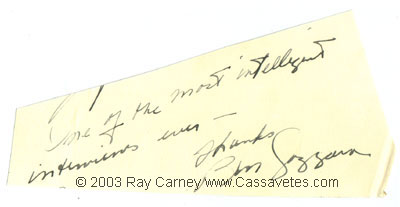 Harvard. He was legendary, a kind of Benjamin Jowett of Harvard—refined,
distinguished, classically educated. People fought to get into the course.
But most of what he said didn’t take with me. I learned a little
from him, but not very much. I was just a dumb freshman from a public
high school and wasn’t ready for what he offered. The opposite
happened in grad school. I had a teacher, Richard Poirier, who most of
the other students didn’t get along with, but for me, everything
he said was gold. Everything. If he talked about the weather I thought
it was profound. If he had taught farming, I would have taken notes. Harvard. He was legendary, a kind of Benjamin Jowett of Harvard—refined,
distinguished, classically educated. People fought to get into the course.
But most of what he said didn’t take with me. I learned a little
from him, but not very much. I was just a dumb freshman from a public
high school and wasn’t ready for what he offered. The opposite
happened in grad school. I had a teacher, Richard Poirier, who most of
the other students didn’t get along with, but for me, everything
he said was gold. Everything. If he talked about the weather I thought
it was profound. If he had taught farming, I would have taken notes.
Teaching and learning are
very mysterious processes. They aren’t
always about what they seem to be about. Sometimes trivial things matter
much more than the ones that are supposed to be important. When I had
Brower, the class I remember most vividly was one where he got off the
subject for about ten minutes and started talking about an opera—I
think it was Don Giovanni—he had listened to the night before at
home. His words made an incredible impression on me—not only since
I had never heard an opera before, in fact I hardly knew what one was—but
because they opened to view of a world where that was what you did at
home at night. I wanted to live that life—one where you read Shakespeare
or Henry James instead of watching television in the evening. The miracle
is that now I do lead that life. But in its early stages a lot of learning
is childish, monkey-like imitation. I was no Brower, but I saved up my
money and bought a copy of Don Giovanni and listened to it in my dorm
room, and pretended I was him.
The only other class with
him I remember, we were reading a scene in The Tempest where the sailors
are telling jokes. Brower asked the class
what we thought of the jokes. Since it was Shakespeare, we figured we
knew the right answer so we came up with all of these observations about
how brilliantly witty and profound they were. Then he dropped the bomb,
and told us they were stupid and not funny—that Shakespeare was
that smart—that when he had dumb characters, he gave them dumb jokes! It rocked my world—which is undoubtedly why I still remember
it so many years later. I suddenly realized that art wasn’t necessarily
about idealization and perfection and beauty but about truth—however
rough or unpalatable or stupid. Art didn’t have to be up on Olympus.
It could include clumsiness, awkwardness, and bad jokes. Things that
were in my life. Of course it took me a long time to get from the sailors
to Cassavetes’ salesmen in Faces or the off-balance balance of
Suzanne Farrell in Agon, but you might say that everything I’ve
written about the poetry of imperfection comes out of that class with
Brower.
I’ve also had non-academic teachers who were incredibly important
to me—one man named Philip Kapleau and another named Walter Nowick.
I spent a few years on a commune and after that in a couple Zen Buddhist
monasteries and they were the teachers. They would give brief talks to
the whole group—sometimes fifty other people would be sitting there,
but it was as if they were speaking to me alone with every word. As if
they could see into my heart and say the thing I needed to hear at that
moment. That’s what real teaching is. What it means is that I was
ready for what they were saying. I’m a believer that a teacher
comes along when you are ready. And I believe the converse too: that
if you are ready, everything is a teaching. Of course, everything is a teaching, day and night, in class and out of it. Our problems, our
hurt feelings, our pains, our confusions are all lessons—if we
have ears to hear. It’s so easy to close our hearts.
Cynthia Rockwell: You know so much about various arts from jazz to dance,
and include them so much in your Boston University courses, that I wonder
how you learned this material. Did you take courses in different arts?
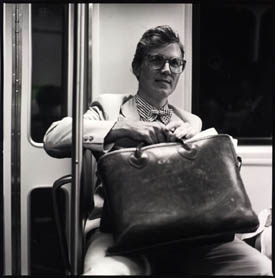 Ray Carney: No. I have to
confess I learned everything in a totally slipshod, haphazard way.
Over the years, I’ve sat in on a few lectures
in various subjects here and there, of course, but I haven’t officially
enrolled in any formal courses since the ones I took to get my Ph.D.
I really think you can teach yourself anything—from auto mechanics
and computer repair to theoretical physics—if you are motivated.
When someone says they can’t learn something, it’s almost
always because they don’t really want to learn it. It’s not
important enough to their lives at that moment. All learning is emotional.
When your emotions are involved, when your life depends on something—imaginatively
or physically—you can master almost any situation. Ray Carney: No. I have to
confess I learned everything in a totally slipshod, haphazard way.
Over the years, I’ve sat in on a few lectures
in various subjects here and there, of course, but I haven’t officially
enrolled in any formal courses since the ones I took to get my Ph.D.
I really think you can teach yourself anything—from auto mechanics
and computer repair to theoretical physics—if you are motivated.
When someone says they can’t learn something, it’s almost
always because they don’t really want to learn it. It’s not
important enough to their lives at that moment. All learning is emotional.
When your emotions are involved, when your life depends on something—imaginatively
or physically—you can master almost any situation.
But you get to a point in
your life when courses seem too slow and teachers don’t seem daring and original enough to stimulate you. So you
read books. I’m a crazy reader. I love reading. The thrill never
goes away. What an astonishing invention writing is, a book is! I still
can’t get over it. Reading your way through a subject can be a
very active and exciting process when you’re highly motivated—you
don’t read passively like you do when you’re a student. When
your life is at stake to master something before you go—and whose
life isn’t at stake in that way?—you test your wits against
each author, seeing where one disagrees with another, and where you can
out-think them, pitting one against the other, trying to answer fundamental
questions.
I love to read! I’ve been on a Henry James jag for about five
or six years now. Re-read all of his novels and short stories.
It’s my third or fourth or fifth time through them at this point,
but I can’t get enough of them. I’m also a compulsive note-taker—scribbling
notes in the margins of my books or in a series of tablets and notebooks.
One of my TAs saw one of my James books and told me I was the John Madden
of marginalia! That’s a good comparison. You can understand a lot
of things that seem very mysterious by drawing circles and arrows around
parts of them. I have file cabinets full of notes that will never see
the light of day. I think I’m into working on something like tablet
number twenty-two in my current James binge.
Lately I’ve also been on a pretty big microbiology kick too. I
bought some Biology textbooks that were remaindered because they went
into new editions and picked up ten or twenty other books and started
teaching myself organic chemistry and cell biology. It’s better
than a three-dimensional chess game. Cell structure and energy
conversion are pretty interesting stuff. Really amazing actually. You
can have the Alps and the Matterhorn, right now protein folding, and
amino acid creation, and the DNA major grove are my sublime.
I read a lot of books about
art, but I stay away from most criticism. I think the real teachers,
the only ones that I trust, are the artists.
That’s what I thought when I was into math and physics also. There
was nothing that could top reading the stuff the discoverers wrote: Euclid,
Euler, Newton, Gauss, Michelson, Einstein, Planck. If you really want
to know what it feels like to be Michelangelo, read his letters on painting
and sculpture. If you really want to know what it was like to be Beethoven,
read accounts of things he said by people who talked with him. But the
most important lessons are not from an artist’s writing but from
looking at his or her work and getting it to teach you what you need
to know.
The ultimate “texts” to learn art from are the works themselves.
I learned about Shakespeare’s life not from a biography, but the
plays. You can feel the high-spirited sassiness of his youth in Midsummer
Night’s Dream, his middle-aged discouragement and disillusionment
in Hamlet 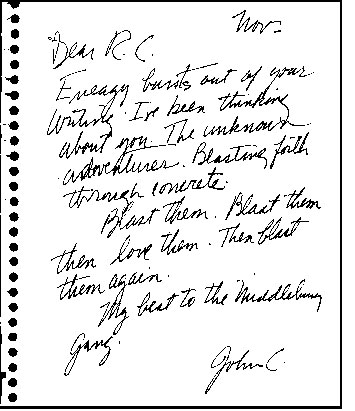 and Lear, and his final acceptance of what can and what can’t
be in the late romances. Watching Paul Taylor’s Esplanade and George
Balanchine’s Jewels taught me more about expressive abstraction
and narrative structure than any art course ever did. Wordsworth’s
Prelude and Henry James’s Ambassadors taught me the function of
style. Louis Armstrong and Billy Holiday taught me about tone and timbre.
The great film teachers in my life were named Bresson and Tarkovsky and
Cassavetes—and dozens of others of course. and Lear, and his final acceptance of what can and what can’t
be in the late romances. Watching Paul Taylor’s Esplanade and George
Balanchine’s Jewels taught me more about expressive abstraction
and narrative structure than any art course ever did. Wordsworth’s
Prelude and Henry James’s Ambassadors taught me the function of
style. Louis Armstrong and Billy Holiday taught me about tone and timbre.
The great film teachers in my life were named Bresson and Tarkovsky and
Cassavetes—and dozens of others of course.
Cynthia Rockwell: Your newest book, Cassavetes
on Cassavetes, has an
interesting structure. It is a posthumous autobiography of sorts, drawn
from years of archived interviews with the filmmaker, but interwoven
with Cassavetes' own words is a considerable amount of your own description
and critique of the man's work and methods. Was the book always conceived
as a biography or did the concept evolve over years of research?
Ray Carney: If you don’t toss and turn in your sleep and change
your mind a trillion times while you’re working on a project like
this, you aren’t alive. If you don’t rejoice on some days
at your own brilliance and despair on others about your stupidity, you’re
not allowing yourself to learn anything. Everything changes every day.
I thought I knew all there
was to know about Cassavetes when I began. After he died I spent eleven
years talking to people who worked with
him. And reading and re-reading things he had said. Reading transcripts
and listening to tapes no one had ever heard before. Every time I talked
to another person, I saw new things. Everything I thought I knew turned
out to be wrong. My understanding of the films changed totally. I realized
that they were much more personal than I had imagined. A lot of the events
in them were veiled portraits of things in his life or emotional events
connected with his marriage to Gena Rowlands—though Cassavetes
threw viewers off the scent by casting Rowlands as himself! I kept rewriting
the headnotes up until the night before the book went to the printer.
I’m still rewriting them—scribbling things in my own copy
of the book—as I realize new things. I have hundreds of pages of
new ideas. Amazing stuff. No one will ever see that material, but writing
through my confusions is the only way I can come to grips with them.
I feel incredibly lucky to
have picked a filmmaker who was complex enough to bear this kind of
scrutiny without becoming boring or conventional.
There are very few questions worth devoting years of your life to. Most
of them are religious and have to do with life and death. But where art
comes from and how it works its magic is on the same level. How did Rembrandt
get so much of what it is to be human into his portraits? Where did Bach’s
music come from? Where is Shakespeare in his plays? The Cassavetes
on Cassavetes book is my attempt to grapple with these sorts of questions.
How is a great work of art made? What does it cost emotionally? What
confusions does it embody? The headnotes are my stabs at answers. It
really is the mystery of life itself—what makes it so magical,
rich, and strange. What luck to be able to write about that.
Cynthia Rockwell: In Cassavetes
on Cassavetes, the filmmaker mentions
several directors he admires, including Frank Capra and Carl Dreyer,
both of whom you've also written books about. Did Cassavetes inspire
you to study these filmmakers or does this simply reflect a connection
between their work and your own personal artistic interests?
Ray Carney: I guess great
minds think alike. But seriously, I just write about things that I
love and don’t understand. It’s no different
from obsessing about a person you are in love with. You can’t stop
wondering. What makes them tick? What makes them so amazing one minute
or so annoying the next? Writing is just a way of thinking and feeling
more clearly than day-dreaming.
Capra may seem like the odd
man out in all this talk about “art,” but
I find his work complex and tragic. When I went to the library to try
to read something about it, all I could find was this ridiculous, reductive
pop culture analysis—all that stupid stuff about how he believed
in the American dream and the common man, as if he were the cinematic
equivalent of Norman Rockwell. That had nothing to do with my experience
of his films. Norman Rockwell doesn’t make me cry. So I realized
I’d have to write my own book if I wanted to figure out why they
affected me so deeply. You know the saying—if you want to go to
a party, give a party? Well, I wanted to read a book about melodramatic
expression, so I wrote one.
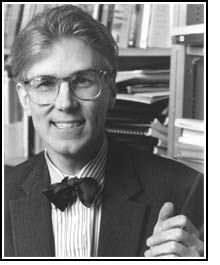 Cynthia Rockwell: While it's clear from the Cassavetes
on Cassavetes and Shadows books that you greatly admire Cassavetes and his work, you
also make a point to describe how Cassavetes could be a pretty awful
man at times. Do you include this information simply to give a fair assessment
of the man's life, or do you think it relates to his work in some way? Cynthia Rockwell: While it's clear from the Cassavetes
on Cassavetes and Shadows books that you greatly admire Cassavetes and his work, you
also make a point to describe how Cassavetes could be a pretty awful
man at times. Do you include this information simply to give a fair assessment
of the man's life, or do you think it relates to his work in some way?
Ray Carney: Stanislavski’s My
Life in Art meant a lot to me as
a college student because it went behind the scenes to show what it really
took to make art. Not the Mickey Rooney “let’s-put-on-a-play” version
of creation, but the real doubts, fears, and pains that go into doing
anything difficult and brave. I didn’t want to simplify things
in the Shadows or the Cassavetes on Cassavetes books. There are a lot
of different people, different moods and feelings, in every one of us.
A lot of contradictions. We can be good and bad, generous and selfish,
perceptive in lots of ways and cluelessness in others. My portrait of
Cassavetes is cubistic. It’s fragmented and unresolved. That’s
the only way it could be true. It’s up to the reader to decide
how to feel about Cassavetes in the end.
Cynthia Rockwell:
In addition to being a respected critic and author, you are a professor
of film
studies at Boston University with a teaching
style that many of your students describe as ”inspirational.” Can
you draw any connections between your own teaching philosophy and Cassavetes'
philosophy of filmmaking? Or your approach to film criticism?
Ray Carney: I don’t know anything about the “inspiring” stuff.
I’m just a very emotional person. In fact, a basket case—pretty
close to the edge a lot of the time—though I usually manage to
keep it pretty well-concealed. All my teaching is just my own attempt
to understand these amazing things we call works of art. It’s an
extended conversation with students in which I often think I learn more
from their comments than they do from mine. All I do is point out things:
Did you hear that tone in her voice? Did you see how he hesitated in
his response? Did you notice the way the next shot wasn’t what
we expected? Do you see how that scene changes our understanding? I’m
just like one of those architectural tour guides who point out things
to look up at. It’s up to the student to make something out of
those millions of little observations.
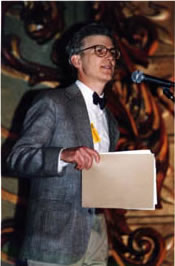 Cynthia Rockwell: Do you think there's an advantage to studying or working
in film in New England, outside the hubs of New York and Los Angeles? Cynthia Rockwell: Do you think there's an advantage to studying or working
in film in New England, outside the hubs of New York and Los Angeles?
Ray Carney: Art can be made
anywhere. Some of the greatest contemporary films are being made in
Iran. New York has lots of artists to talk to
and lots of art to see, and that’s in favor of it. But it’s
a fashion-conscious city, addicted to money, power, and business values,
and impossibly expensive to live in for a starving artist. That’s
all against it. Why anyone would live in Los Angeles, I’ll never
understand. There’s nothing there. You might as well choose to
live on the moon. But I guess you could make art there too. It would
just be harder, since the air is so thin and life is so unreal—which
is probably why art hasn’t happened to the city yet. Lester Horton
is the exception that proves the rule. Boston is not bad, though it’s
also very expensive, and the fashionable parts of the city are way too
tame, too yuppified and conservative for my taste. Too Harvardized. What
an over-rated university! Boston has too many intellectuals and stockbrokers—if
there’s a difference anymore. Neighborhoods like Dorchester and
Roxbury and Chelsea are better places to live in that respect. You escape
from the cultural craziness just a little.
I’m interested in films that are in touch with the lives of people
who are not intellectuals or artists. Works with roots in a community
of caring people. Works anchored in local neighborhoods and ways of being.
All the things Hollywood avoids and hates with a passion. They know it’s
always easier to present grandiose David Lynch metaphors than it is truthfully
to show how a particular mother and son really interact on a specific
day.
Cynthia Rockwell: Can you list any contemporary filmmakers whose work
you admire?
Ray Carney: Tom Noonan, Abbas
Kiarostami, and Mark Rappaport are three favorites, though Noonan has
only been able to release two movies [What
Happened Was... and The Wife] in ten years. He filmed a third three or
four years ago, but doesn’t have enough money to finish it. And
even if he does, no distributor has shown a jot of interest in picking
it up. Then there’s Charles Burnett, Su Friedrich, and Jay Rosenblatt.
Killer of Sheep, To Sleep with Anger, Sink or Swim, Rules
of the Road,
Period Piece, and Human Remains are all amazing movies. Rob Nilsson and
Gordon Eriksen are also good filmmakers with roots in local communities.
I don’t read newspapers or newsmagazines or watch broadcast TV,
since I am not interested in wasting my time keeping up with the so-called “news,” but
these artists give me the emotional news I need to stay alive. They are
writing the real history of the present—beyond anything that will
ever appear in the New York Times. As Ezra Pound put it so long ago,
they write the news that stays new—forever.
*
* *
Ray
Carney Interviewed by
Features
Editor Mary Alice Blackwell
Printed in The Daily Progress newspaper
in Charlottesville, Virginia
RAY CARNEY will be introducing films and
conducting an on-stage question and answer session with Gena Rowlands
following a screening of Gloria at this years Virginia Film Festival. He is
generally recognized to be the world's expert on the life and work of
the so-called father of the American independent movement, actor-writer-director
John Cassavetes. He has just published three new books about the filmmaker:
Cassavetes on Cassavetes, described as a profound spiritual autobiography
of the filmmaker; the British Film Institute Film Classics volume on
Cassavetes first film, Shadows, which re-constructs the lost
first version of the film from conversations with the director before
he died; and a viewers guide to the films titled: John Cassavetes:
The Adventure of Insecurity. Prof. Carney will be signing and selling
copies following several of the Festival events, and all three books are
available at the University Bookstore.
He is a Professor of Film and American Studies
at Boston University, Chairman of the Film Studies program, and Director
of graduate admissions. More information about his work is available at
the web site devoted to independent film and art he maintains at: http://www.Cassavetes.com.
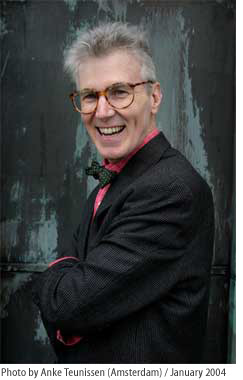 How
did you get involved with the Virginia Film Festival this year? How
did you get involved with the Virginia Film Festival this year?
Every
Film Festival has a personality. Some are week-long cocktail parties;
some extended ski vacations; some high-finance, business, and deal-making.
I am invited to help out with events at dozens of Festivals a year, but
to tell you the truth, I'm not a serious enough drinker, skier, or schmoozer
to be interested in attending most of them. The Virginia Festival is a
time for relaxed thought, deep reflection, and intelligent conversation
about the art of film. The association with the University of Virginia
makes a real difference. The audiences take movies seriously, and the
themes Richard Herskowitz [the director] organizes each Festival around—this
years its Masquerades—provide an intellectual focus for serious
thought and discussion. Of course, that doesnt mean the Festival isn't
entertaining. Ideas can be a lot of fun!
Did you have an input into the selection
of films?
I
made a few recommendations about which Cassavetes films might work well
with the theme and made a few suggestions on where to get them. Cassavetes
work plays once in a while on cable television, but it is still hard to
catch on the big screen, the way movies were meant to be seen. Fortunately,
Richard Herskowitz is very resourceful at locating prints, one of which,
I believe, is being flown in from Vancouver, Canada specially for the
event.
Weren't you in Charlottesville before?
I
was here a few years ago to introduce some screenings and participate
in a panel discussion with Roger Ebert and Mark Edmundson on Irony.
The topic seems prescient given recent reflections in the light of the
events of Sept. 11th on the frivolousness and irresponsibility of Hollywood
and American culture in general. The perpetual wink, nod, and smirk of
Tarantino and the Coen brothers seems even more out of touch, even more
adolescent and immature in the world we were ushered into on that day.
A little background on you. You are
such a well respected scholar on film, what got you started in this line
of work? It seems you would make a fine screenwriter.
I
don't know about the screenwriting observation. I find writing in my own
voice is hard enough. I don't think I could manage to do it in five or
ten other voices.
It's
a bit of a mystery how anyone ends up doing anything, isn't it? You walk
a zig-zag path, shaped by happy accidents, and end up some place you never
could have anticipated. I began college as a math major, shifted to physics,
then went to philosophy and psychology. I then took a Ph.D. in English
literature and wrote my dissertation on William Wordsworth. My first full-time
academic job was teaching literature in an English Department.
I
really wasnt that interested in movies. I have to blame Cassavetes for
getting me into film criticism and analysis! After I had stumbled into
a few of his films more or less by accident, I went to the library to
find something to read about them. He had been making films for almost
twenty years at that point, but there was almost nothing in print
about him—beyond brief reviews—not a single decent book or essay.
So I decided to write something myself. I used to joke him that I wished
my name were Pauline Kael or Vincent Canby, because it would have done
him a lot more good than having me write about him! I was just an unknown,
unimportant graduate student at the point I began my first book. I've
written lots of others since then—about other things beyond Cassavetes.
But I didn't abandon my other loves. Right now I'm working on one book
about Henry James and another about American painting.
On Cassavetes: What made you choose
Cassavetes? Was it the man, his movies, or his pioneer methods? What was
it that sparked such an interest that your were willing to spend so many
years on research. (I think it was a great choice. But I always wonder
why writers pick their subjects when there are so many to choose from.)
It
may sound strange to say it, but I write out of my bewilderments, my confusions,
my doubts. To try to figure something out. To see what makes it tick,
and to try to find out what I think about it. If I understand something,
it's the last thing I would want to sit down and spend years of my life
working on. It would be boring to write about.
I
walked out of the first Cassavetes movie I ever saw. It was Faces,
and I was only a college student at the time. The movie was just too much—too
confusing, too strange, too weird emotionally. It didn't play by the rules
of the film game. I couldn't figure out the characters. They wouldn't
stand still for me to understand them. They kept changing. I couldn't
put handles on their situations or my own emotions. Scene after scene
kept surprising me. And my own responses kept bewildering me. In short,
the movie threw me for a loop. It was the darnedest experience.
A
few years later, I saw a couple more Cassavetes movies, though I didn't
realize they were by the same filmmaker until later: Minnie and Moskowitz
and A Woman Under the Influence. A Woman Under the Influence
affected me incredibly deeply. Near the end of the film, in a scene that
has been cut from current prints, where the children run down the stairs
the third time, I remember thinking: I don't know whether I like this
movie or hate it, and I don't know whether to laugh or cry or what at
this scene, but this is the most amazing experience I've ever had in a
movie theater. The movie was intellectually flabbergasting and emotionally
unclassifiable. It was a tragedy in many respects, but, paradoxically,
it made me feel grateful to be alive, to be able to see and feel all the
things that were in it. After the screening was over, I couldn't talk.
I wanted to be alone. I walked away from the theater, down a side street,
went up on a deserted hill where there was a darkened church, quiet and
all alone, and whooped—though I didn't understand why. I just knew
I had lived through something amazing, and had to do something to get
it out.
The
next day was when I made my fateful visit to the library, to discover
how little was written about Cassavetes, and how bad the little bit that
existed was. I had to write the book to work through my confusion.
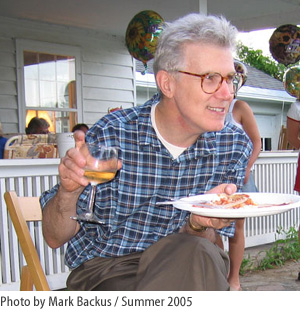 Also,
how did you meet Cassavetes? Also,
how did you meet Cassavetes?
Though
time seems compressed when you describe something, it took me a year or
two more to get started on it, and I didn't actually finish the book for
a few more years after that. Before I could write anything, I had to search
out his movies and try to see as many of them as possible. That took a
long time—about four or five years in all. It was before the video
revolution and I was teaching at a small college in Middlebury, Vermont,
which was not exactly a Mecca for obscure independent films, so once I
had resolved to write something, I had to travel to Boston and New York
to try to catch screenings when I could. Id do anything to see his movies.
I was a lowly paid beginning faculty member and spent most of my money
traveling. Just crazy, I guess. I remember going to New York and Boston
(at my own expense!) more than once to catch a single Saturday or Sunday
afternoon museum screening and then going home. It wasnt always a happy
experience, I flew to L.A. one time because Cassavetes was directing a
play he had written, and it was only going to be there for about a month.
But when I arrived I couldn't get a ticket for the day or two I was able
to be there, and didn't have enough money to stay any longer. Young and
dumb.
I only got
to know him in the final decade of his life. Our first real contact began
sometime in 1980 I think it was when I sent him the American Dreaming
manuscript. It was the first book in any language about his work. When
he received a four-inch-thick stack of typewriter paper in the mail, I
think he realized that I wasn't just another gushing fan who says how
much they love his work . He offered some corrections to my manuscript,
which I then rewrote, and started a correspondence with me via letter and
phone call. I visited him on the West Coast later on. Going into his house
was like entering a ghost town - all those memories of scenes from Faces
and Minnie and Moskowitz and Opening Night and Love
Streams. The bar where Richard tells Maria he wants a divorce, the
room where Chettie dances with the ladies, the breakfast nook where Jim
greets his wife and children, the dining room with the crystal chandelier
where Myrtle goes for the seance, the kitchen in Robert Harmon's house.
Everything was a set from one of his movies.
But it is indicative of how
reluctant America was to recognize his work during his lifetime that it
took three or four years to get my book published. He really just didn't
exist as a director at that point. The film professors who were the readers
for the kinds of presses I sent the manuscript to didn't take him seriously.
Most of them still don't. The first four or five presses I submitted the
book to told me that Cassavetes wasn't a "real" director, but
just an actor who clowned around with his friends on screen. The movies
were regarded as total, disorganized messes. Why would I want to write
about them or take them seriously at all? It was a first-hand illustration
of Clement Greenberg's adage that "all profoundly original art looks
ugly at first."
Here
it is eleven years after Cassavetes death, and he is finally being taken
seriously, at last. In some ways, it was better before he was accepted.
There was a purity to the group of true believers. Once something becomes
fashionable, it subtly changes the experience. The private, frightened,
shaking ecstasy becomes an accepted religion. What is it Emerson says?
The religion becomes a church—a set of rules and ceremonies and codified
beliefs that drain the life from the original experience. I'm in favor
of keeping the mystery alive. Art is nothing if not mysterious.
Anyway,
he and I had a fascinating series of conversations about film in that
final decade—in person, on the telephone, and in letters. Those interactions
and tons of other material are the basis for my Cassavetes on Cassavetesand Shadows books, which reveal things he told me about his
life and work that he never told anyone else. I call them his Rosebud
conversations. Really amazing stuff, where he told me secrets about
how he made the films. I've thought about why he said some of these things
to me and I think I finally understand. He was sick, knew he didn't have
long to live, and wanted to straighten out the record on some things.
Also I was a very safe person to talk to, since I lived on the east coast
far from where he was, and also because he knew I wasnt a journalist
and wasnt going to rush into print with anything he said. It was strictly
for posterity. Thats why I held onto these things for so many years.
They sat in my file cabinet and I was so sad that he wasnt around that
I didn't even want to look at them for a long time. But I won't say any
more. Youll have to read the books to find out what he said about his
work—or go to my web site (www.Cassavetes.com), which has excerpts
from my writing.
This
page only contains excerpts from interviews Ray Carney has given. In the
two interviews excerpted, Ray Carney discusses his background and academic
training. For more information about his writing on independent film,
including a collection of interviews with him in which he gives his views
on criticism, film, and the life of a writer, click
here.
|










